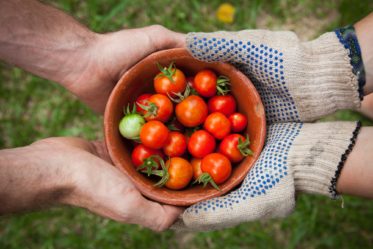
COVID-19 has triggered unprecedented changes in lives across the world. For many years, the majority of consumers have purchased products and services from brands they know and trust. But as campaigns around healthy eating habits and product quality gained momentum, we’ve seen a sharp shift in food buying preferences. This, along with a number of other factors, has made consumers much more aware of how their food is sourced, produced, and consumed. What am I eating? Where does it come from? Consumers are now becoming sustainable food customers.
With this shift in consumer behavior comes new opportunities for businesses that have adapted to this new way of thinking around food – from farm to factory to fork. In the past, restaurants and grocery stores only competed on price. Now, they have to offer something that makes them stand out from competitors. Food operators that are reluctant to change risk losing customers who are looking elsewhere. To keep up with this new trend, businesses are starting to implement strategies that’ll grow their customer base while maintaining a solid reputation for sustainable food products.
Consumers are now firmly focused on the ingredients in their diets, and the sustainable methods used in their sourcing and production. Dairy, meats, and vegetables, all food categories, are scrutinized by consumers. Sustainable food customers are also looking at the environmental impact of these food categories, and this has significantly influenced and altered their food purchasing habits.
Consumer-driven trends in the food buying space
While purchases are currently centered on the most basic needs, people are shopping more consciously, buying local, and embracing digital commerce. The food industry has always been driven by consumer demands for convenience and affordability, but now these desires are being shaped even more so due to increased awareness about sustainability.
Buying local
A summary of Google searches as reported by Alba Collart found an increase in searches for the phrases “local food”, “cottage food” (home food processing), and “home gardening.” Why is that? Well, an item produced locally is thought to be touched fewer times and therefore has a greater perception of safety.
A survey conducted at the height of the pandemic found that 44% placed emphasis on buying local. Limiting food waste (68%) and shopping more health consciously (60%) were top priorities for consumers. Pointedly, most respondents indicated that this trend will continue post-pandemic.
Health and wellness
Consumers are now focused on health and wellness more than ever before. They are looking to cut calories, sugars, salt, and carbs while increasing their intake of protein-rich foods, healthy fats, vitamins, and minerals. They are giving up on processed foods and preferences have shifted from gratifying food choices to more functional food choices and immunity-boosting alternatives.
From December 2020 to March 2021, the Covid-19 tracker in the UK asked respondents about their food concerns. Some 28% of respondents reported being concerned about the quality of food produced in the UK, while 50% reported being “concerned” about the quality of food imported from outside the United Kingdom.
In March this year, research commissioned by the Food Standards Agency in the UK found that 22% of participants reported having anxieties about the food they were eating.
Their biggest concerns were:
- The “healthiness” of food in their diets (53%)
- Animal welfare (52%)
- The ethical treatment of producers and farmers (50%)
- Food freshness (50%)
- Hormones, steroids, or antibiotics in food (50%)
Environmental concerns
Then, there are the so-called “green concerns”. According to a McKinsey Packaging Survey, more than half of US consumers are highly concerned about the impact of packaging on the planet. In South Africa, the government increased the plastic shopping bag levy in 2020 in a bid to reduce plastic pollution, and leading retailers are either phasing out single-use plastic or scrapping plastic bags completely.
Influencer shopping
Inspired by celebrities like Sam Smith and Katy Perry, many younger consumers are also following a “clean eating” diet, based on more whole foods – fruit, vegetables, lean proteins – and fewer processed or packaged foods. Reduction in meat consumption and meat substitution is also a growing trend, with start-ups, excuse the pun, meeting this demand with plant-based proteins. This shift is expected to grow as consumers move away from unsustainable and high carbon footprint meat production methods.
Utilitarian goods
In a survey of more than 13,000 respondents across 16 nations in January 2021, food ingredient supplier Kerry (Beloit, WI) found that four out of 10 shoppers had expanded their consumption of so-called utilitarian (useful or practical rather than attractive) foods, drinks, and dietary enhancements since the pandemic began – 42% of respondents said that their consumption of unprocessed foods and drinks had increased, while 44% said they had purchased more dietary enhancements.
The pandemic has made people more aware of the fragility of health and the need to look after themselves. More than ever before, consumers are making the link between their diet and their health, with a survey finding that 63% of Americans are making an increased effort to eat and drink healthier in the future because of the pandemic.
With consumers increasingly conscious of their food choices, brands need to make sustainable options a business priority. Consumers are striving for food waste reduction and cost-conscious shopping while buying only what they really need which means that this needs to be an important part of any business’s offerings. The world is changing at breakneck speed so it’s imperative companies keep up with the latest consumer trends if they want to continue growing.
Supply chain shortages have made customer buying decisions more complex
Over the past year, supply chain disruptions have become top-of-mind for nearly all Americans and have had a widespread impact on day-to-day life. A September 2021 survey by Oracle found that 82% of Americans are scared that supply chain issues will negatively affect their life and 87% said they have been adversely impacted by supply chain issues over the past year.
Almost all (91%) plan to change their buying behavior moving forward, including buying in bulk and stocking up on items (49%). In addition to bulk buying, 40% of survey respondents said they’re rationing essential items to avoid running out.
Supply chain disruptions have Americans worried about:
- Items being out of stock (62%)
- Difficult to buy seasonal products (45%)
- Not getting ingredients they need for dinners and family traditions (28%)
With supply chain issues a major media talking point and dinner table conversation starter, consumers are getting savvier about which brands can deliver on their promises. In fact, 40% of Americans now pay closer attention to global shortages of regularly used items. And the finding that should resound among brands: 78% of Americans say they’d be more willing to buy from a company if they knew it used digital tools to manage its supply chain.
Since the start of the pandemic, the large supply chains that were holding cross-country produce transport were hit hard. Shipping companies expected a drop in demand and docked most of their fleet. This caused extreme supply chain crunches and food shortages across Europe.
The UK bore the brunt as it was dealing with the contentious Brexit negotiations at the same time. According to research published in the European Journal of Public Health, the European Food Banks Federation reported that 80% of member states reported an increase in the number of people in need of emergency food assistance in late March of 2020.
Everything from random shortages of grocery items to online shipping delays can all be traced back to the pandemic-induced global supply chain disruption. When there are interruptions or delays in one link of the supply chain, a potentially devastating knock-on effect across the entire system is inevitable. And the shortage of essential food items has affected customer food purchasing patterns.
Effect of company policies on sustainable food customers
“More and more, we’re hearing from our customers and consumers that they want foods that are produced in a sustainable manner,” notes Courtney Hall, protein technical sustainability manager at Minnesota-based global food giant, Cargill.
Part of that consumer demand is knowing how their food is sourced. They also want to play an active role in the decision-making process of what they consume. Sustainable food customers are also placing huge emphasis on the transparency practices of a company. Research conducted by the Hartman Group suggests that 70% of consumers believe that a company’s sustainability practices need to be open to the public.

Photographer: Elaine Casap | Source: Unsplash
To meet the demands of transparency from customers, more organizations are becoming, well, more transparent. They are communicating their sustainability objectives, practices, and methods openly. The end goal is to bring issues to light with regards to challenges on the path to sustainability and the efforts being made to get there. The financial benefits of operating sustainably and transparently can be considerable – ranging from increased revenue and market value to a boosted bottom line.
The food industry turns to field sales CRM solutions to give them the edge
We’ve seen a clear shift in the way that consumers buy and consume food. They want to know where their food comes from, what it contains, how it was produced, how it’s packaged. This has created new opportunities for agile businesses that have adapted to this striking shift in consumer behavior.
To stay relevant and competitive, businesses are looking for CRM solutions that go beyond the regular data capture and storage. They needs a system that also provides meaningful insights into customers’ needs through actionable data. Unlike other CRM or sales enablement technology, Skynamo is designed specifically for manufacturers, wholesalers, and distributors with sales reps in the field selling products to an existing customer base.

Photographer: Joshua Rodriguez | Source: Unsplash
Skynamo’s field sales CRM solutions have unique features that make the process of managing customer engagement and sales data effective. With detailed reports, offline access, cloud data storage, offline access, and real-time GPS tracking, we can help your business adapt to today’s changing times with a digital-first approach. Skynamo also offers a public API that can be integrated into third-party software to access client data to enable collaboration between multiple stakeholders in the sales process.
Additionally, Skynamo integrates with a number of ERP and accounting packages (Xero, Sage Systems, Quickbooks, SAP, Microsoft Dynamics 365, and many more) to provide sales reps with access to the latest pricing and customer and stock information. Our CRM solutions enable transparency between teams throughout the entire process of selling your product which builds trust with customers so you can keep them engaged and satisfied.
Contact the Skynamo team today and learn how our dynamic systems can transform your business by providing visibility into every aspect of customer interactions along the journey to purchase.
